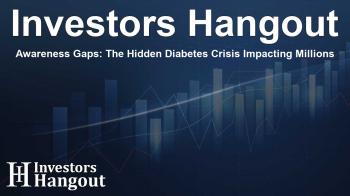Awareness Gaps: The Hidden Diabetes Crisis Impacting Millions

A Surprising Global Health Challenge
New estimates reveal that diabetes is a silent epidemic, affecting millions worldwide. The latest information from the International Diabetes Federation highlights that nearly one in nine adults, approximately 589 million individuals, have diabetes. Alarmingly, over 252 million of these adults are unaware of their condition, putting them at great risk for significant complications and premature death.
Unrecognized Risk and Complications
This concerning statistic paints a troubling picture. Many individuals may only receive a diabetes diagnosis once they already exhibit one or more related health issues. These missed opportunities for early detection can lead to complications, as the annual figures show that diabetes accounts for over 3.4 million deaths globally.
Staggering Projections for the Future
Looking forward, the number of adults diagnosed with diabetes is expected to reach 853 million by the year 2050. This projection unveils the urgent need for immediate and effective intervention. It is crucial to enhance early detection processes and raise awareness of diabetes, especially in regions where individuals are often unaware of their risk status.
The Financial Burden of Diabetes
The financial implications of diabetes are staggering, with global health expenditures surpassing one trillion US dollars for the first time. This dramatic increase in healthcare costs is a strong indicator of the burden diabetes has on individuals and health systems alike.
The 11th Edition of the Diabetes Atlas
Since its first release in 2000, the IDF Diabetes Atlas has provided vital insights into the global diabetes crisis. The 11th edition reflects enhanced methodologies that take into account evolving health trends, prevalence rates, and focuses on the often undiagnosed cases of diabetes. This new release serves as a call to action for governmental bodies and the healthcare sector to prioritize diabetes awareness and early diagnosis.
Expert Opinions: Urgent Calls for Action
Professor Dianna Magliano, who co-chairs the IDF Diabetes Atlas Committee, emphasizes that the newfound data should ignite action and promote initiatives aimed at improving the lives of millions living with diabetes. Professor Edward Boyko adds that addressing the rising trend will necessitate greater awareness and a robust focus on preventive measures and monitoring practices.
The Seriousness of Diabetes Complications
Diabetes is linked to numerous severe health complications, which include cardiovascular diseases, kidney failure, and nerve damage. Current estimates indicate that individuals living with type 2 diabetes are significantly more susceptible to heart failure compared to those without this condition.
Governmental Responsibility
The International Diabetes Federation stresses that rising diabetes prevalence necessitates immediate governmental action. By investing in preventive healthcare programs, particularly in areas where diabetes is often undiagnosed, authorities can help mitigate diabetes risks among vulnerable populations.
Conclusion: The Road Ahead
IDF President, Professor Peter Schwarz, conveys the message that the current findings demand urgent and unified action from global leaders. With many people living with diabetes not yet diagnosed, the priority should be on enhancing screening, early diagnosis, and education to combat this growing public health challenge. Numerous sectors must collaborate to address this issue effectively; healthcare providers, educators, and technology firms all share a responsibility.
About the International Diabetes Federation
The International Diabetes Federation (IDF) unites over 240 national diabetes associations across more than 160 countries, committed to improving the lives of people affected by diabetes as well as preventing the disease. Their work is pivotal in advocating for awareness and education concerning this critical global health issue.
About the IDF Diabetes Atlas
The IDF Diabetes Atlas stands as a key resource on the worldwide effects of diabetes. First published in 2000, this authoritative document has evolved to include comprehensive statistics on diabetes prevalence and related health expenditures, significantly aiding in our understanding of the disease's impact.
Frequently Asked Questions
What is the current global prevalence of diabetes?
Nearly 589 million adults globally are living with diabetes, which is one in nine adults.
How many people are unaware they have diabetes?
It is estimated that 252 million individuals globally do not know they have diabetes.
What prevents people from being diagnosed early?
Lack of awareness and access to healthcare services in certain regions can lead to late diagnoses.
What are the main complications linked to diabetes?
Diabetes can lead to multiple serious complications, including heart disease, kidney failure, and vision loss.
What actions should governments take to address this crisis?
Governments should invest in preventive healthcare programs and promote awareness to help detect high-risk individuals early.
About The Author
Contact Kelly Martin privately here. Or send an email with ATTN: Kelly Martin as the subject to contact@investorshangout.com.
About Investors Hangout
Investors Hangout is a leading online stock forum for financial discussion and learning, offering a wide range of free tools and resources. It draws in traders of all levels, who exchange market knowledge, investigate trading tactics, and keep an eye on industry developments in real time. Featuring financial articles, stock message boards, quotes, charts, company profiles, and live news updates. Through cooperative learning and a wealth of informational resources, it helps users from novices creating their first portfolios to experts honing their techniques. Join Investors Hangout today: https://investorshangout.com/
The content of this article is based on factual, publicly available information and does not represent legal, financial, or investment advice. Investors Hangout does not offer financial advice, and the author is not a licensed financial advisor. Consult a qualified advisor before making any financial or investment decisions based on this article. This article should not be considered advice to purchase, sell, or hold any securities or other investments. If any of the material provided here is inaccurate, please contact us for corrections.

